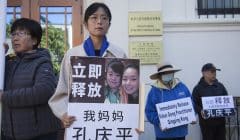Internet Censorship and Cyberdissidents
People's Republic of China: State control of the internet in China.
Political Dissidents and Others Imprisoned for Using the Internet
The Internet, e-mail and Bulletin Board Services (BBS) have been used by dissidents, Falun Gong practitioners, Tibetan exiles and others to circulate information or protest against repression, publicise their cause or to draw support for online petitions and open letters. E-mail and the Internet have also provided a means of communication within China and with the Chinese dissident community abroad. […]
- Huang Qi was arrested in June 2000 after he had set up his own website, www.6-4tianweg.com which called for political reforms, and helped dissidents trace missing relatives following the crackdown on the 1989 pro-democracy protests. Huang Qi was charged with subversion and tried in secret in August 2001. Over two and a half years after his arrest Huang Qi is still detained without a verdict having been announced. For more details see, State Control of the Internet in China: Appeal Cases, AI Index: ASA 17/046/2002.
- Members of the Falun Gong spiritual movement, banned in July 1999 as a ‘heretical organization’, have used the Internet and e-mail to circulate information about repression against the group. Some have been arrested as a result. The Chinese authorities have now shut down the group’s websites and blocked overseas websites. At least 14 Falun Gong practitioners have been detained and imprisoned for Internet-related offences, several have died in custody reportedly as a result of torture. See State Control of the Internet in China, Appeal Cases, AI Index: ASA 17/046/2002, November 2002.
Amnesty International has investigated the cases of 33 people believed to be prisoners of conscience. They have been detained or are serving long sentences in prison or labour camps for Internet-related offences. Three have died in custody, two of whom reportedly died as a result of torture, and there are reports that others have been tortured or ill-treated in detention.
Those tried are reported to have been denied fair trial, in violation of international standards for fair trial. Many trials were held in secret. Six of those tried are still waiting for the verdict to be announced. Sentences against others range from two to eleven years. Those detained include 14 members of the Falun Gong spiritual movement, four members of the China Democracy Party, and other political dissidents. They come from Beijing and a variety of provinces in China.
All were peacefully exercising their right to freedom of expression and opinion. The accusations against them include circulating and downloading articles calling for political and social reform, greater democracy and accountability or redress for abuses of human rights. Most have been charged with “subversion” or membership of a “heretical organization”. This latter charge has been used widely against Falun Gong practitioners and members of other Qigong or religious groups banned by the authorities. See appendix at the end of this document and the separate document entitled, State Control of the Internet: Appeal Cases, November 2002, AI Index: ASA 17/046/2002.
[…]
Filtering
In mid-September 2002, China introduced new filtering systems based on key words, regardless of site or context. Filtering software has reportedly been installed on the four main public access networks in China. Prohibited words or strings of words on websites, e-mail, foreign news sites and search engines are affected. Users trying to access information which includes key words such as ‘human rights’, ‘Taiwan’, ‘Tiananmen’, ‘Falun Gong’ and ‘Tibet’ are blocked and browsers indicate that the “page cannot be displayed”.
[…]
The Closure of Internet Cafes
Following a fire at Lanjisu Internet café in Beijing in June 2002 which killed 25 people, the Public Security Ministry announced that it had closed down 2,400 Internet cafes in Beijing for safety reasons. Officials in other cities such as Shanghai and Tianjin took similar action. Since then the authorities have introduced a range of regulations affecting Internet cafes, instituted government checks and ordered filtering software to be installed. […]
Several weeks after the Beijing Internet café fire, the government ordered all Internet cafes to augment their filtering software within weeks and to keep records of all users for a 90-day period. The software prevents access to 500,000 foreign websites, such as foreign newspapers, Falun Gong websites, websites on democracy and human rights and others which are considered “reactionary” or are “politically-sensitive”. Those attempting to access these banned sites are automatically reported to the Public Security Bureau. Internet police in cities such as Xi’an and Chongqing can reportedly trace the activities of the users without their knowledge and monitor their online activities by various technical means.
Full report: http://www.amnesty.org/en/library/asset/ASA17/007/2002/en/dom-ASA170072002en.html






